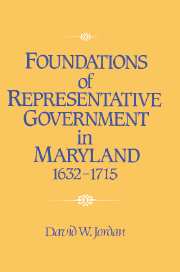Book contents
- Frontmatter
- Contents
- Acknowledgments
- Introduction: “For the Good and Happy Government” of Maryland
- Part I “In the Infancy of This Plantation”: 1632–1660
- Part II “Lord Baltimore's Politick Maximes”: 1660–1689
- 3 “For the Most Part Good Ordinary Householders”
- 4 “To Liken Us to a Conquered People”
- Part III “Wee Your Majesties Most Humble and Loyall Subjects”: 1689–1715
- Epilogue: “Our Present Happy Protestant Constitution”
- Appendixes
- A Note on the Sources
- Index
4 - “To Liken Us to a Conquered People”
Published online by Cambridge University Press: 14 September 2009
- Frontmatter
- Contents
- Acknowledgments
- Introduction: “For the Good and Happy Government” of Maryland
- Part I “In the Infancy of This Plantation”: 1632–1660
- Part II “Lord Baltimore's Politick Maximes”: 1660–1689
- 3 “For the Most Part Good Ordinary Householders”
- 4 “To Liken Us to a Conquered People”
- Part III “Wee Your Majesties Most Humble and Loyall Subjects”: 1689–1715
- Epilogue: “Our Present Happy Protestant Constitution”
- Appendixes
- A Note on the Sources
- Index
Summary
They [the lower house] are not to Conceive that their privileges run paralell to the Commons in the Parliament of England, for that they have no power to meet but by Virtue of my Lords Charter, so that if they in any way infringe that they destroy themselves; for if no Charter, there is no Assembly, No Assembly no Privileges. Their power is but like the common Council of the City of London which if they act Contrary or to the overthrow of the Charter of the City run into Sedition & the Person Questionable.
Chancellor Phillip Calvert to lower house, April 24, 1669Forasmuch as the Cheifest and onely foundation & support of any kingdome State or Commonwealth is the provideing enacting & establishing good and wholesome lawes for the well Ruleing & Government thereof & allsoe upon any necessary & imergent occasions to Raise & leavy money for the defraying the Charges of the said Government & defence thereof neither of which according to the Constitutions of this Province can be made ordeined established Leavyed or raysed but by & with the Consent of the freemen of this Province by their severall delegates and representatives by them freely nominated chosen & Elected to serve for their severall Cittyes & Countyes in a Generall Assembly and for as much as the Safest & best rule for this Province to follow in Electing such Delegates & representatives is the presidents of the Proceedings in Parliament in England as neere as the Constitution of this Province will admitt the Delegates of this present Generall Assembly doe humbly pray That itt may be Enacted.
Preamble to An Act directing the manner of Ellecting and Summoning Delegates and Representatives to serve in succeeding Assemblyes, 1678 (vetoed by Charles Calvert, third Lord Baltimore, 1681)- Type
- Chapter
- Information
- Publisher: Cambridge University PressPrint publication year: 1988



